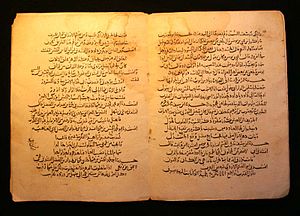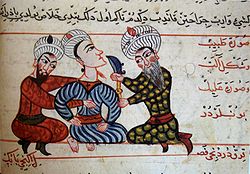- House of Wisdom
-
The House of Wisdom (Arabic: بيت الحكمة; Bayt Ul-Hikma) was a library and translation institute established in Abbassid-era Baghdad, Iraq.[1] It was a key institution in the Translation Movement and considered to have been a major intellectual centre during the Islamic Golden Age. The House of Wisdom was a society founded by Caliph Harun al-Rashid and culminating under his son al-Ma'mun, who reigned from 813–833 AD and is credited with its institution. Al-Ma'mun is also credited with bringing many well-known scholars to share information ideas and culture in the House of Wisdom Based in Baghdad from the 9th to 13th centuries, many of the most learned Muslim scholars were part of this excellent research and educational institute.
House of Wisdom is a calque of the Middle Persian term for a "library" and it was modelled on the libraries of the Sassanid Empire. It had the dual purpose of translating books from Middle Persian to Arabic and also of the preservation of translated books.[2]
During the reign of al-Ma'mun, observatories were set up, and the House was an unrivalled center for the study of humanities and for science in medieval Islam, including mathematics, astronomy, medicine, alchemy and chemistry, zoology and geography and cartography. Drawing on Persian, Indian and Greek texts—including those of Pythagoras, Plato, Aristotle, Hippocrates, Euclid, Plotinus, Galen, Sushruta, Charaka, Aryabhata and Brahmagupta—the scholars accumulated a great collection of world knowledge, and built on it through their own discoveries. Baghdad was known as the world's richest city and centre for intellectual development of the time, and had a population of over a million, the largest in its time.[3] The great scholars of the House of Wisdom included the Iranian Muḥammad ibn Mūsā al-Khwārizmī, the "father" of algebra, which takes its name from his book Kitab al-Jabr.
Contents
Origins
In the Abbasid Empire, many foreign works were translated into Arabic from Persian, large libraries were constructed, and scholars persecuted by the Byzantine Empire were welcomed.[4] Works were also translated at the Academy of Gundishapur, during the Muslim conquest of Persia.
In 750, the Abbasid dynasty replaced the Umayyad as the ruling dynasty of the Islamic empire, and in 762, the caliph al-Mansur (reigned 754 – 775) built Baghdad and made it his capital (the previous capital having been Damascus). The Abbasid dynasty had a strong Persian bent,[4] and adopted many practices from the Sassanid empire – among those, that of translating foreign works, except that now works were translated into Arabic. For this purpose, al-Mansur founded a palace library, modeled after the Sassanid Imperial Library.
The House of Wisdom was originally concerned with translating and preserving Persian works[citation needed], first from Pahlavi[citation needed], then from Syriac and eventually Greek and Sanskrit. Works on astrology, mathematics, agriculture, medicine, and philosophy were thus translated.
The Barmakids were influential in the ensuing movement of restoring and preserving Persian culture. They are also credited with the founding of the first paper mill in Baghdad. The secret of papermaking had been obtained from Chinese prisoners taken at the Battle of Talas (751). Previously, copyists used papyrus (which is fragile) or parchment (which is expensive). The introduction of paper thus facilitated the proliferation of books and libraries.
The concept of the library catalog was introduced in the House of Wisdom and other medieval Islamic libraries, where books were organized into specific genres and categories.[5]
The activities of the library was supported by a large number of stationery shops. These shops doubled as bookshops, the largest of which, al-Nakim, sold thousands of books every day. This industry was only possible because of the abundance of paper (warraqa).
Under Al-Ma'mun
Under the sponsorship of caliph al-Ma'mun (reigned 813 – 833), it seems that the House of Wisdom took on new functions related to mathematics and astrology. The focus also shifted from Persian to Greek texts.
At that time, the library was directed by the poet and astrologer Sahl ibn Haroun (d. 830); the other notable scholars associated with the library are Muhammad ibn Mūsā al-Khwārizmī (780–850), the Banu Musa brothers (Mohammed Jafar ibn Musa, Ahmad ibn Musa, and al-Hasan ibn Musa), Sind ibn Ali and Yaqub ibn Ishaq al-Kindi (801–873).
Christian scholar Hunayn ibn Ishaq (809–873) was placed in charge of the translation work by the caliph. The most renowned translator was the Sabian Thābit ibn Qurra (826–901). Translations of this era were superior to earlier ones, however, soon after, the emphasis on translation work declined, as new ideas became more important.[citation needed]
The House of Wisdom flourished under al-Ma'mun's successors al-Mu'tasim (reign 833–842) and al-Wathiq (reign 842 – 847), but declined under the reign of al-Mutawakkil (reign 847–861), mainly because Ma'mun, Mu'tasim, and Wathiq followed the sect of Mu'tazili, while al-Mutawakkil followed orthodox Islam. He wanted to stop the spread of Greek philosophy which was one of the main tools in Mu'tazili theology.
The House of Wisdom eventually acquired a reputation as a center of learning, although universities as we know them did not yet exist at this time — transmission of knowledge was done directly from teacher to student, without any institutional surrounding. Maktabs soon began to develop in the city from the 9th century, and in the 11th century, Nizam al-Mulk founded the Al-Nizamiyya of Baghdad.
Destruction
Along with all other libraries in Baghdad, the House of Wisdom was destroyed during the Mongol invasion of Baghdad in 1258.
Other houses of wisdom
Some other places have also been called House of Wisdom:
- In Cairo, Dar al-Hikmah, the "House of Wisdom", was another name of the House of Knowledge, founded by the Fatimid Caliph Al-Hakim bi-Amr Allah in 1004.
- There is a research institute in Baghdad called Bayt al-Hikma after the Abbasid-era research center. While the complex includes a 13th century madrasa, it is not the same building as the medieval Bayt al-Hikma. It was damaged during the 2003 invasion of Iraq33°20′32″N 44°23′01″E / 33.3423°N 44.3836°E
- The main library at Hamdard University in Karachi, Pakistan is called 'Bait al Hikmah'. It is the largest library in Pakistan.[6]
- A high school located in Qatif, Eastern Province, Saudi Arabia
See also
- Round city of Baghdad
- Brethren of Purity
- Dar Al-Hekma
- Dar Al-Hekma College
Notes
- ^ Iraq: The 'Abbasid Caliphate, Encyclopedia Britannica
- ^ Josef W. Meri, Jere L. Bacharach, Medieval Islamic Civilization: An Encyclopedia, Published by Routledge, 2006, ISBN 0-415-96690-6, p. 451.
- ^ George Modelski, World Cities: –3000 to 2000, Washington DC: FAROS 2000, 2003. ISBN 2-00309-499-4. See also Evolutionary World Politics Homepage.
- ^ a b Wiet. Baghdad
- ^ Micheau, Francoise, "The Scientific Institutions in the Medieval Near East", pp. 988–991 in (Morelon & Rashed 1996, pp. 985–1007)
- ^ Bait al hikmat
References
- Morelon, Régis; Rashed, Roshdi (1996), Encyclopedia of the History of Arabic Science, 3, Routledge, ISBN 0415124107
- Encyclopedia of the History of Arabic Science (limited on-line access)
External links
- Centuries in the House of Wisdom in The Guardian – overall history with particular focus on the House of Wisdom
- Legacy of the Islamic Golden Age, with details on the House of Wisdom
- Pictures of the modern Bayt al-Hikma and the damage it took during the 2003 invasion of Iraq.
- Iraq Manuscript Collections, Archives, – Libraries Situation Report, includes a description of the modern Bayt al-Hikma and its looting.
- Jeff Oaks: The scholarly milieu of Abu'l-Wafa, with references to the House of Wisdom
- Was al-Khwarizmi an applied algebraist? – with discussion of the role of House of Wisdom (references George Makdisi and Dimitri Gutas)
- Translation Movements in Iran; Sassanian Era to Year 2000, Expansion, Preservation and Modernization
- The Transmission of Knowledge – A case study: the Arab acquisition of Greek science.
Categories:- 9th-century establishments
- Buildings and structures in Baghdad
- Defunct libraries
- History of Iraq
- Educational institutions established in the 8th century
- History of Islamic science
- Arabic architecture
- Libraries in Iraq
- Destroyed landmarks
Wikimedia Foundation. 2010.


